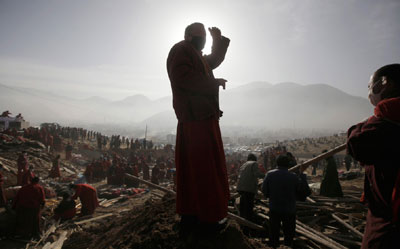Let Us Learn From Disaster
Cover Editorial - EO print edition no. 466
Translated by Tang Xiangyang
Original article: [Chinese]
The earthquake that occurred in Yushu County of Qinghai Province claimed the lives of over 2,000 people, left many homeless and has left the entire country in mourning.
During the past few days, we've seen how our whole society has responded. Brave people are searching for clues of survivors in debris without any tools; people from all over China are pouring into the remote county and trying to offer a hand. Facing an unexpected disaster, people in Yushu and all of China are showing great courage and determination.
What else have we seen? We have seen mutual aid - the whole country making great effort to assist Yushu; tears - TV anchors crying for the earthquake victims; a superior system - people following their leaders and lining up to give donations; and, of course, we've also seen the names of TV and movie stars written on big signs with the amount of the money they donated.
Yushu county is cold and it needs us to provide it with warmth; facing the rubble, we need to rebuild the social order; we must give those feeling helpless the confidence and courage to start a new life.
Of course, what's more important is, we must remember the cold, the ruins and the feeling of helplessness, not for the purpose of morbidly experiencing pain or re-exposing wounds, but for the purpose of never forgetting.
Yes, maybe we have gotten used to forgetting. The Chinese tradition tells us to turn bad things into good. We have gotten used to turning bad into good and searching for light in darkness. Such strange logic does not give us enough time to process the disaster before we quickly turn the page.
An old Chinese saying goes, hardships may strengthen a nation. But in order to strengthen, we should reach a full and profound understanding of the disaster. Only when we understand the causes and science behind the disaster and learn from and reflect on the experience, will our country rise again. Otherwise, those disasters will always be disasters.
The tradition of "when someone is in trouble, people from all over come to help" and "nationwide mobilization" can be a part of the disaster-relief mechanism, but wouldn't it be more timely and effective if we organized people nearby and used more scientific means to deal with the disaster? After a disaster, donations are indeed one type of effective compensation mechanism, but wouldn't it will be better if we found a daily disaster-relief mechanism? As we face the recurrence of natural disasters, we should reevaluate the current system of response.
Though China has experienced many disasters throughout history, Chinese people are never frightened. Zhuangzi, an ancient Chinese philosopher, once said: "The universe gives me my body so that I may be carried, my life so I may toil; my old age so I may repose, and my death so I may rest. To regard life as good is the way to regard death as good." We can't be as free and easy as Zhuangzi, but we should not accept having our spirits distorted and blinded by disasters.
Disasters are inevitable. Humanity has become civilized and progressed through fighting natural disasters. But each disaster should be a record of our progress. Reevaluating our construction quality, founding a disaster-relief system, establishing an effective scientific resettlement mechanism, providing psychological relief for victims, all should serve as steps our country takes as it rises from the ruins left by disaster. By remembering these steps, we will never forget that the lives lost today will save lives in the future.
Let disaster be. Let's call a spade a spade. Praise what deserves praise, atone for what should be atoned, and investigate what must be investigated; this is the right attitude.
This article was edited by Rose Scobie
Links and Sources
Boston.com: Image
The views posted here belong to the commentor, and are not representative of the Economic Observer |




















